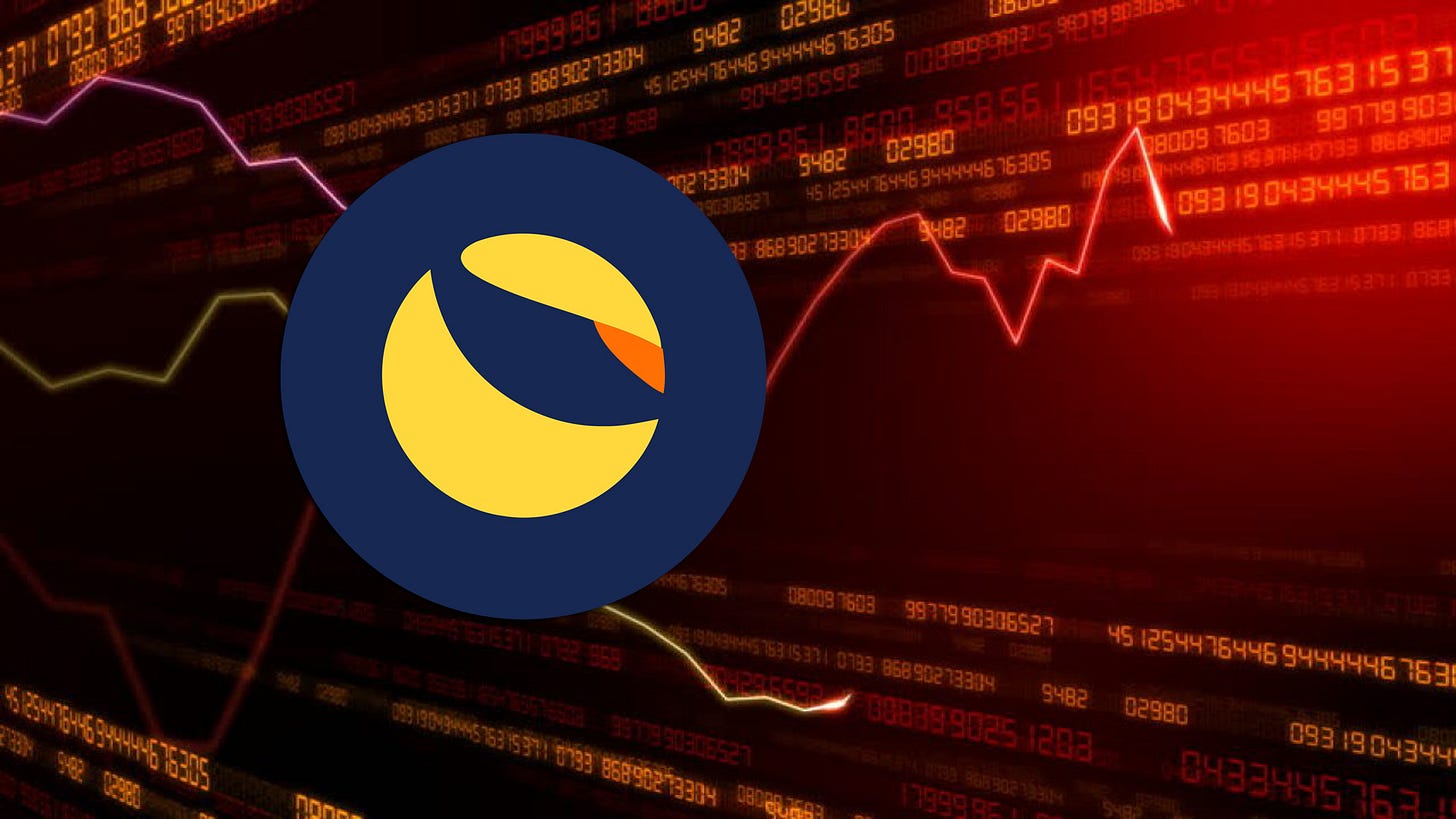This Cycle's Cleansing
The Culling of the Degens
Every crypto bull market attracts “degens” (crypto speak for degenerates) of all shapes and statures.
These degens act in ways that do great harm to crypto markets and to the digital asset industry at large.
Now, as the tide is washing out in this crypto cycle, we are seeing who this cycle’s top degens are and the damage they’ve done.
So, without further ado, here’s a list of the most pernicious degens of the post 2020-2021 crypto bull market cycle:
Do Kwon
Do Kwon is the co-founder of the Terra (LUNA) ecosystem - valued at just over $60 billion as recently as two months ago - which crashed and burned hard in May. I covered some of the crash here.
Do Kwon liked to run his mouth on Twitter:
Mr. Kwon is now choking on a hefty slice of humble pie, which might only be the least of his punishment, as he may face criminal charges if the allegations that he cashed out $2.7 billion in assets from Terra ecosystem assets are true. Plus, he is now being forced to comply with a subpoena from the SEC related to Mirror Protocol.
Looks like Do Kwon won’t be debating himself on Twitter soon enough.
Alex Mashinsky
This class act just halted all withdrawals from his crypto-lending platform Celsius. Some have speculated that he was offering such high yields on the assets that customers lent Celsius because he was yield farming with those assets. So great.
Some have also speculated that he had a lot of exposure to the Terra (LUNA) ecosystem when it went down. Awesome.
At one point, Celsius had over $10 billion assets under managements (AUM). Now, no one knows if he has the liquidity to make his lenders whole.
Let me take a moment to teach a lesson here.
What we have/had in Celsius is basically an unregulated, shittier version of a bank. Because Celsius doesn’t/didn’t touch US Dollars, it didn’t have to get a banking license. And so it was taking customer deposits, doing God knows what with them, and promising its customers an unusually high yield on these assets.
That was all going well enough when crypto was in a bull market, when money was plentiful (on paper, at least), but now that it’s in a bear market, it seems that Celsius doesn’t have the liquidity to make its investors whole. Basically, Celsius was engaging in fractional reserve banking AKA not holding enough assets on its balance sheet to fully reimburse creditors.
All major banks in the US operate this way, as well, but the heads of those banks can sleep well at night knowing that the US Government/The Fed will bail them out with US Dollars - and to the detriment of the US Dollar - whenever these banks are underfunded.
But this is crypto, a world of finance where no one comes to save you when things go wrong. So, now Celsius’ creditors will suffer - at least so long as they can’t withdraw the digital assets that they lent the platform.
Plus, Mashinsky has basically handed regulators the evidence they’ve been looking for to justify their policing this industry more strongly. Wins all around. We’re really doing great.
I’m not even against the regulation. I wrote about how self-policing a sector of financial industry hasn’t worked historically here. We really can’t have nice things in any space that attracts degens.
Lesson #1 in Crypto
The lesson that Celsius lenders are now learning the hard way is a lesson they should have learned on the first day that they chose to invest in this space, and that lesson is the following: not your keys, not your coins.
I explain what this means in the video below.
I also wrote about this concept for NASDAQ’s website here, and I spoke with The U.S. Sun about it here.
If you think you are exempt from learning this lesson, you will likely learn the hard way that you aren’t.
Okay, lesson over.
Let’s move on to the next degens on our list.
Zhu Su and Kyle Davies
Su and Davies head/headed a digital asset hedge fund in Singapore called Three Arrows Capital (3AC). These silly geese were also heavily exposed to the Terra (LUNA) ecosystem when it collapsed. They were also trading/investing a bunch of different cryptos with heavily leveraged positions. The Tweet below breaks their situation down quite well.
Now, it looks like 3AC may be insolvent. Fun part here is it looks like crypto lender BlockFi lent them lots of bitcoin. So, if 3AC is insolvent, it looks like BlockFi will now be at risk, too. True degeneracy across the board. Nice work, big players. YOU’RE ALL DOING A GREAT JOB!!!
Let me get to the last degen on the list before I wrap this up.
You
If you’re trading crypto with leverage, you’re a part of the problem. I spoke about this in the video below.
 Tiktok failed to load.
Tiktok failed to load.Enable 3rd party cookies or use another browser
Crypto is a highly volatile asset class. It’s the cocaine of finance - and the more cocaine-y the highs and lows get the further out you go on the crypto asset risk curve. Trading it with leverage is like saying, “Hey man, this cocaine isn’t getting me high enough; pass me that heroin.” I know, I know. I’ve said this before, but it bears repeating.
How Far We’ve Strayed
The ethos of Bitcoin is “Be your own bank.” Not “Be a highly-leveraged maniac trader.”
“Be your own bank” means that you have to learn how to properly self-custody your assets. I’ve said this many times and in many ways. If you still haven’t done that, then all you have claim to are IOUs from centralized systems (like Celsius), systems that aren’t so different from the banks and traditional financial institutions that Bitcoin was created take us away from.
As Caitlin Long says in your “homework” video below, the price of a bitcoin didn’t hit $100k during this bull run is because people were buying centralized IOU and derivative bitcoin products and trading it with leverage this cycle.
If you don’t have the keys to your bitcoin or crypto in cold storage or at least in your own wallet (not on an exchange or in the hands of a third-party custodian), then you are holding down bitcoin’s price. Let me explain…
When you take the keys from digital assets from an exchange or out of the hands of a third party custodian, you convert your crypto from an IOU for the asset to the actual asset. When you do this, it makes the exchange have to buy more of those assets to keep on their balance sheet (at least theoretically), thus, propping up the price of the asset.
Furthermore, we are learning from the Celsius fiasco that you might not be able to ever get your keys to your assets back. So, my suggestion would be to take them back now, before the next bank run on a crypto platform takes place.
Moving Forward
Now, like Abigail Johnson, the CEO of Fidelity Investments says in a piece I was quoted in, it’s time to rebuild. If the crypto contagion keeps spreading and The Fed sends us into a stagflationary (Is that a word?) environment, Bitcoin and crypto markets will likely continue to go much lower.
How much lower? I don’t know. Maybe $14k BTC and $800 ETH. Really depends on how grim things get.
Personally, I’ll be DCAing into this crash.
You do you, though, because nothing in this newsletter is financial advice.
Homework
If want a more in-depth breakdown of some of the details behind this leverage-induced crypto crash, I highly suggest listening to what the brilliant Wall St. vet, crypto pro, owner of Custodia Bank, and Forbes contributor Caitlin Long has to say in the interview below.
May the degeneracy end soon.
Best,
Frank
Twitter: @frankcorva
“You’ll own nothing and be happy.” -World Economic Forum (WEF)





